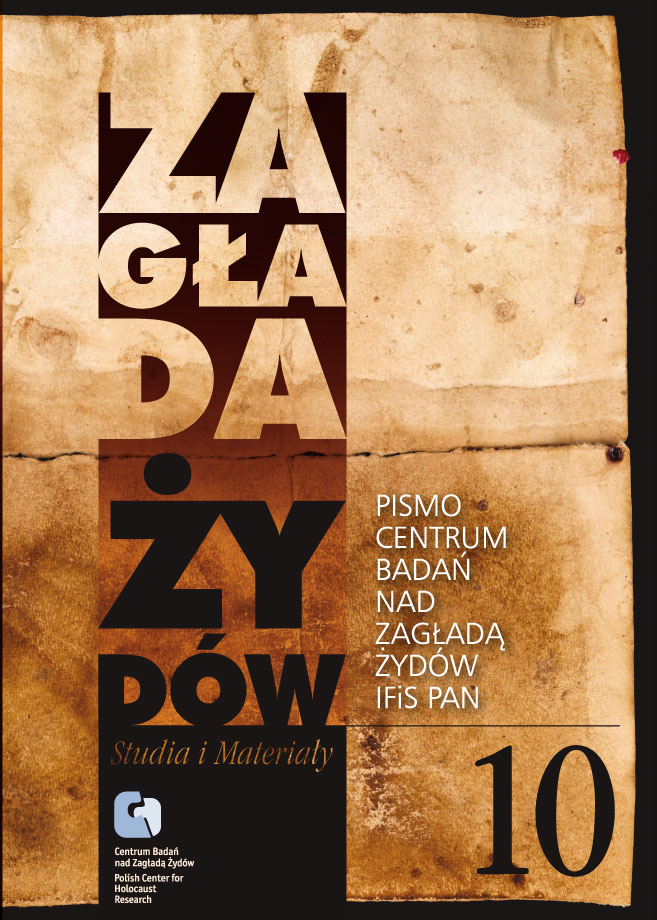Czy prawda nas wyzwoli? Przełamywanie oporu psychologicznego w przyjmowaniu wiedzy o Zagładzie
Zagłada Żydów. Studia i Materiały, Nr 10 (2014), Strony: 803-822
Data zgłoszenia: 2020-10-26Data publikacji: 2014-12-01
 https://doi.org/10.32927/ZZSiM.549
https://doi.org/10.32927/ZZSiM.549
Abstrakt
The introduction of the programs on Holocaust education in Poland and a broader debate on the transgressions of Poles against the Jews have not led to desired improvement in public knowledge on these historical events. A comparison of survey results from the last two decades (Bilewicz, Winiewski, Radzik, 2012) illustrates mounting ignorance: the number of Poles who acknowledge that the highest number of victims of the Nazi occupation period was Jewish systematically decreases, while the number of those who think that the highest number of victims of the wartime period was ethnically Polish, increases. Insights from the social psychological research allow to explain the psychological foundations of this resistance to acknowledge the facts about the Holocaust, and indicate the need for positive group identity as a crucial factor preventing people from recognizing such a threatening historical information. In this paper we will provide knowledge about the ways to overcome this resistance-through-denial. Implementation of such measures could allow people to accept responsibility for the misdeeds committed by their ancestors.
Słowa kluczowe
stosunki polsko-żydowskie , teoria tożsamości społecznej , opór psychologiczny
Licencja
Prawa autorskie (c) 2014 Autor&"Zagłada Żydów. Studia i Materiały"

Utwór dostępny jest na licencji Creative Commons Uznanie autorstwa 4.0 Międzynarodowe.
https://creativecommons.org/licenses/by/4.0
Czasopismo publikowane jest w standardzie Diamond Open Access na licencji CC-BY-4.0 Deed - Uznanie autorstwa 4.0 Międzynarodowa - Creative Commons
Inne teksty tego samego autora
- Michał Bilewicz, Nie tylko o „Strachu”. Psychologia potocznego rozumienia historii , Zagłada Żydów. Studia i Materiały: Nr 4 (2008)
- Michał Bilewicz, Karolina Marcinkowska, Społeczna psychologia Holokaustu: od naiwnego sytuacjonizmu do zrozumienia roli ideologii , Zagłada Żydów. Studia i Materiały: Nr 20 (2024)
Podobne artykuły
- Marta Duch-Dyngosz, Magdalena Waligórska, Wąskie widzenie winy: Granice kolaboracji w świadomości świadków w procesach sierpniowych , Zagłada Żydów. Studia i Materiały: Nr 19 (2023)
- Anna Bikont, „Marzeniem pana Poteraja jak i moim jest, aby te niechlubne wydarzenia zostały opisane”. O zbrodni oddziału AK na Żydach ukrywających się na bagnach koło wsi Podosie w Łomżyńskiem , Zagłada Żydów. Studia i Materiały: Nr 18 (2022)
- Zofia Wóycicka, Muzeum dla dorosłych. Nowa wystawa w Miejscu Pamięci Cichych Bohaterów w Berlinie , Zagłada Żydów. Studia i Materiały: Nr 18 (2022)
- Romuald Jakub Weksler-Waszkinel, Jak Pawłowski ukrywał Grinera [Sługa Mesjasza. Z ks. Grzegorzem Pawłowskim/Jakubem Herszem Grinerem rozmawia Lucyna Montusiewicz, Lublin, wyd. Gaudium 2005] , Zagłada Żydów. Studia i Materiały: Nr 1 (2005)
- Grzegorz Krzywiec, Kevin P. Spicer, Hitler’s Priests. Catholic Clergy and National Socialism , Zagłada Żydów. Studia i Materiały: Nr 5 (2009)
- Jacek Leociak, Stanisław Śreniowski, z księgi obłędu i ohydy , Zagłada Żydów. Studia i Materiały: Nr 1 (2005)
- Israel Gutman, Barbara Engelking, O tym jak z wewnątrz warszawskiego getta patrzono na stronę aryjską z profesorem Izraelem Gurmanem rozmawia Barbara Engelking , Zagłada Żydów. Studia i Materiały: Nr 1 (2005)
- Aleksandra Bańkowska, Partyzantka polska lat 1942–1944 w relacjach żydowskich , Zagłada Żydów. Studia i Materiały: Nr 1 (2005)
- Dariusz Libionka, Największe zmartwienie „polskich patriotów” , Zagłada Żydów. Studia i Materiały: Nr 5 (2009)
- Ewa Koźmińska-Frejlak, A Testimony of Silence… Interview with Jerzy Lewiński, a former functionary of the Order Service in the Warsaw ghetto , Zagłada Żydów. Studia i Materiały: 2008: Holocaust Studies and Materials
<< < 1 2 3 4 5 6 7 8 9 10 11 12 13 14 15 16 17 18 19 20 21 22 23 24 25 26 27 28 > >>
Możesz również Rozpocznij zaawansowane wyszukiwanie podobieństw dla tego artykułu.
 English
English
 Język Polski
Język Polski



 https://orcid.org/0000-0001-5027-1691
https://orcid.org/0000-0001-5027-1691





